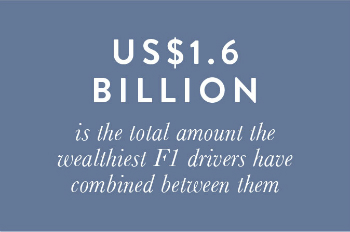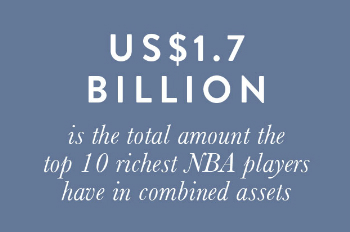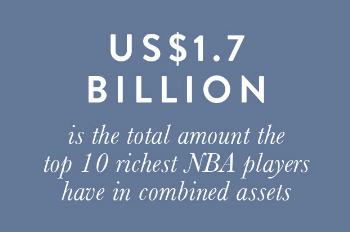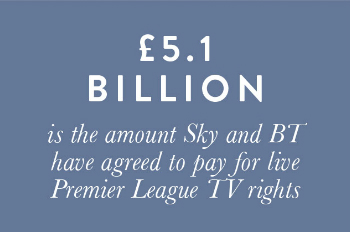
Tara Loader Wilkinson, Editor in Chief at Wealth-X talks about the changes in the sports industry.

There’s a lot of money to be made in football, as demonstrated by the richest football league players, including Real Madrid star Cristiano Ronaldo with fortunes of US$230 million and Argentine forward Lionel Messi with US$180 million. Earnings from sponsorship and wages are on the up, according to Peter Cormack, financial planner at UK-based wealth management company Towry. “Sports industry revenues, especially in football, will always rise mainly due to the income generated by TV rights”. Last month, broadcasters Sky and BT agreed to pay a record £5.1 billion for live Premiere League TV rights, a 70 percent increase on their current deal. Under the new contract 168 games will be shown at an average cost to the broadcasters of £10.2 million per match. Bigger TV audiences of course translate to bigger golden handshakes for players. Deloitte predicts that Premier League clubs’ player spending will total a record £2.5 billion in 2016/2017.

But it is not just footballers earning the big bucks. “Among the most affluent sports today are football, golf, tennis, basketball, car racing and boxing,” says Mike Byrne, UK director at Wealth-X. “Some for their eye-watering wages and some for their lucrative sponsorship deals. Stars are compensated differently according to the sport. Team players like footballers and basketball players earn more money from contracts and wages and the best get supplementary sponsorship deals. Solo athletes like F1 drivers, tennis players and golfers rely more on winnings and endorsements,” adds Byrne.
“Sportspeople never used to be rockstars,” says Byrne. “But over the last ten years compensation has gone through the roof, and looks set to continue as long as the fan base grows.”

More money of course brings more problems. They may be at the top of their game on the pitch or the track, but when it comes to managing their money, sports stars keep getting their fingers burned, which is why a growing number of private banks and wealth managers are targeting sports stars as a lucrative growth sector. Earlier this year it emerged that a number of sports VIPs had been linked to a tax avoidance scheme run by London film firm, Ingenious Media. These included footballers past and present Gary Linekar, David Beckham, Steven Gerrard and Wayne Rooney, and former England cricketers, including ex-England Captain Michael Vaughan, Paul Collingwood, Matthew Hoggard and Ashley Giles who are reportedly liable for unpaid tax. Ex-England goalkeeper David James was declared bankrupt last year after he allegedly lost over £7 million on bad property bets and gambling. Meanwhile, according to a 2009 report, in the United States as many as 78% of NFL players are either bankrupt or under financial stress within two years of retiring, whereas in the NBA, 60% are bankrupt within five years. The reason, more often than not, comes down to bad advice.“The problem is that sportspeople often get very wealthy, very young, and are often not well-versed in accounting matters,” points out Lee Goggin, co-founder of Findawealthmanager.com, a London-based guide to wealth advisors.

Sports stars have uneven income streams and an uncertain end to their career from the threat of injuries. While some are able to go into sports coaching, media, or even like ex-footballer Robbie Fowler, property investment masterclasses, many have no obvious career post-thirty. These types of clients require a “360 solution which encompasses some hardcore tax planning and jazzy structures,” he adds. Guernsey image rights are a way sports stars can monetise their recognisable features and then structure that (and bequeath) it as an asset in its own right.
Wealth managers including UBS, Coutts, Barclays Wealth, HSBC Private Bank, Schroders and Standard Chartered Private Bank have specialist sports wealth management desks to cater to millionaire sports stars. Coutts is now advising its sports star clients to prepare themselves for the power of social media. As the influence of sport grows, this will be the next big money-maker, said Simon Hopes, executive director, sports & entertainment at Coutts.
“Because of social media, image rights have never been more important. It is vital that sports men and women have expert representation to maximise the opportunities associated with their earnings in this area and grow their brand judiciously,” he says.
Players clearly need more advice as they earn more and as media evolves, and those agencies that flourish will be those that can offer full service packages that will incorporate contract negotiation, brand management, digital and social media content management, merchandising, image rights and intellectual property or forge trusted partnerships to ensure that these services are fully exploited. www.wealthx.com
Content by Brett Gregory-Peake, Director at Adoreum.








